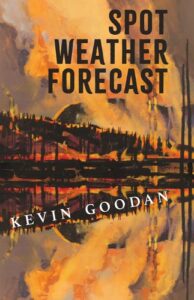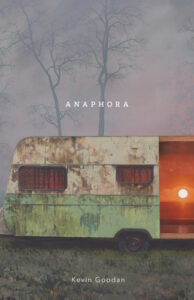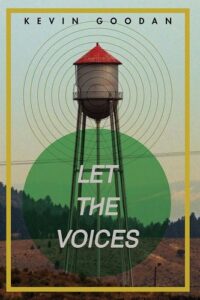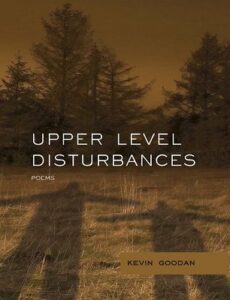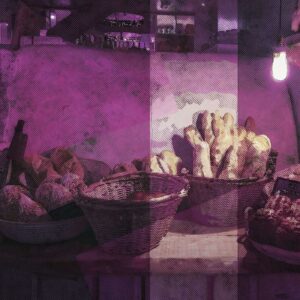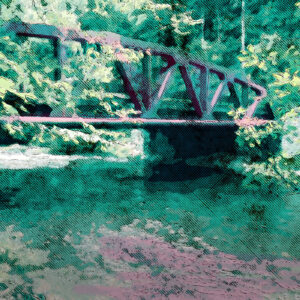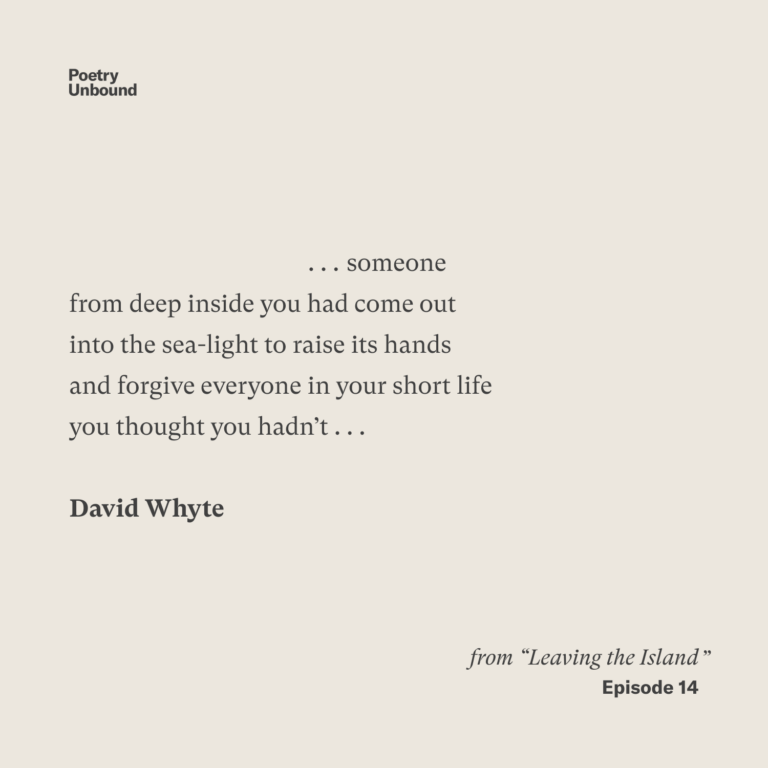Kevin Goodan
We give…
Firefighting pushes the body to breaking point; Kevin Goodan’s poem locates the “ash-dark art” of firefighting not just in the wilderness where the team worked, but in the muscles of the firefighters.
We’re pleased to offer Kevin Goodan’s poem, and invite you to connect with Poetry Unbound throughout this season.
Pre-order the forthcoming book Poetry Unbound: 50 Poems to Open Your World and join us in our new conversational space on Substack.
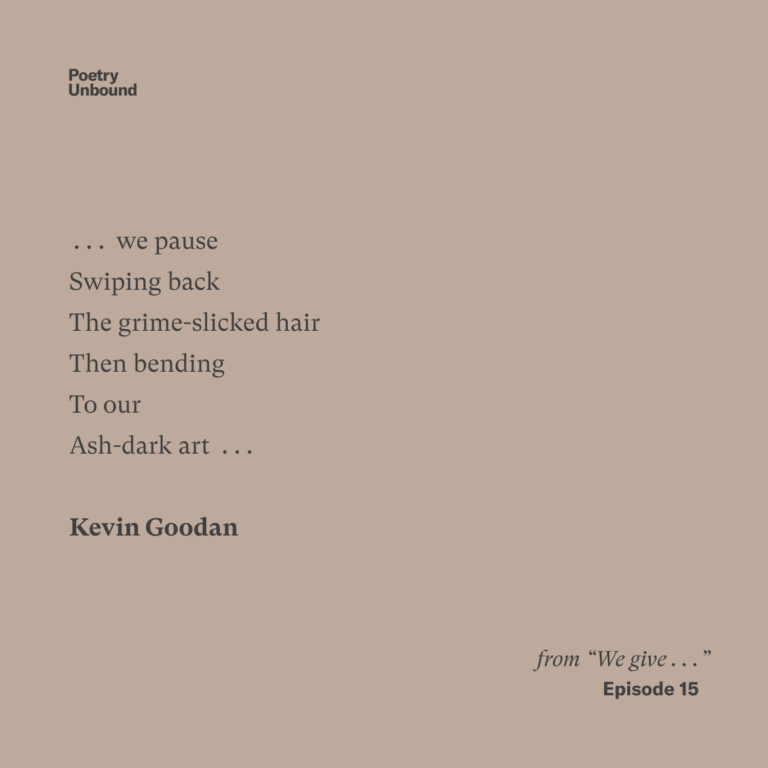
Guest
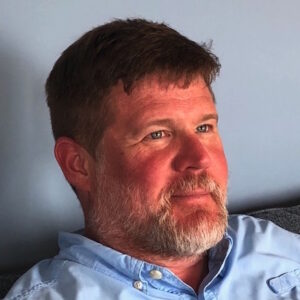
Kevin Goodan was born in Montana and raised on the Flathead Indian Reservation where his stepfather and brothers are tribal members. Goodan earned his BA from the University of Montana and worked as a firefighter for ten years with the U.S. Forest Service before receiving his MFA from University of Massachusetts-Amherst in 2004. He has taught at the University of Connecticut and has served as Visiting Writer at Wesleyan University. He is author of Spot Weather Forecast (Alice James Books 2021), Anaphora (Alice James Books 2018), Let the Voices (Red Hen Press 2016), and Upper Level Disturbances (Center for Literary Publishing 2012).
Transcript
Pádraig Ó Tuama: My name is Pádraig Ó Tuama, and one of the questions I find most complicated to answer in the world is: What do you want? Desire, drive, ambition. These things are profoundly deep in us and often we may not even know why it is that we’re driven to do the things we do. Perhaps we need to observe it, to notice it, to tend to ourselves along the way so that we can survive our drives, too. Poetry, for me, is a drive. I need it. And this is a curiosity for me in other people’s drives. Why do they do the things they do? There’s so many different ways within which desire lives in us, but it lives in us so deeply that it’s always worthwhile to pay attention to what the desire is and where, and how is it driving us.
[music: “Praise the Rain” by Gautam Srikishan]
“We give…” by Kevin Goodan.
“We give
Our lungs
To the fire,
Their frothy
Pink and
Trembling
Capacities.
The hinge-work
Of our knees
Also.
What’s good
Of our backs
We give,
Disks in
The spine
Flattened,
Springing
To the nerves.
Shoulders
Tendon-bright,
Straining
The sockets.
We give
Bruise, we
Give gash
Whatever
Bleeds, bleeds—
Shinbones
Divoted
From tool-blows,
Armpits raw
From sweat-rimed
Nomex
Grating under
Line gear straps,
Heels
Blister-jelled,
Popping,
Back of neck
Seared, glistered.
Give ankles
Hobbled,
Ligaments
Tattered
Sutured
Tattered.
Skin we give
To ember,
To aramids,
To the long
Memory
Cancer has.
Ears given
To squelch,
Break,
Rotor wash,
A far voice
Calling
Weakly
For water
For god
Who is
Water
Out there
In the
Brittle woods.
Give lips
Heat-crazed
Blubbering
Double-time
Double-time,
Water
Boiling
From eyes,
Lashes
Rancid nubs,
A beard,
Moustache
Smoldering,
Tobacco spit,
Tobacco
Slobber.
Fingers
In gloves
In ash
Swollen,
Putty
To the bone,
Lactic surge
In arms
In calves
As we pause
Swiping back
The grime-slicked hair
Then bending
To our
Ash-dark art
Once more.”
[music: “True Shape” by Blue Dot Sessions]
This poem by Kevin Goodan is from a book called Spot Weather Forecast, a fire liturgy, which was just published last year. None of the poems in this book have a formal title, so it just takes the title from the first line of the poem, which in this context is “We give…” It’s a long, snakey poem. Loads of the lines only have two words, or even one.
And Kevin Goodan was raised on the Flathead Indian Reservation in Western Montana. His father and stepbrothers are enrolled members. And he began to work for the U.S. Forest Service when he was 19, and he stayed there for 10 years.
In this book, he particularly thanks the Lolo Interagency Hotshot Crew. Hotshot is a term for a particular role in forest fire and wildfire management and wildfire prevention. I looked up this crew online and saw a list of the demands, the physical demands, that they need to be able to go through in training in order to be on the crew. It’s overwhelming, it’s exhausting, and demanding, and not for the faint hearted. And ultimately the poem reflects that demand. and reflects that take, and the give underneath all of that. The poems in 10 sentences, really, 10 descriptions of the things we give. And the first one is towards lungs and then knees, backs, shoulders, bruises, and gashes, ankles, skin, ears, lips, and fingers.
There’s a phenomenal physicality to the ways within which this work takes a toll on your body. And here, each one of those is linked to the conjugation of the verb “give.” “We give”. And give can mean to transfer, or to pledge, or to make a present of, to provide, to carry out or even cause. The work of a fire crew is a practice of giving. Giving of exhaustion, particularly in a hotshot crew who’ve got to hike in with all of their gear and use pretty rudimentary tools to do everything they can in their role to prevent a fire going forward. And what you see is the giving infuses all of this so much.
There’s an exaltation, there’s a demand, there’s a vibrancy that comes with being right up at the edge that you find here in this poem.
[music: “Angel Tooth” by Blue Dot Sessions]
I think about everything that is asked of people who work in this hotshot crew, you know, everything that he mentions: “What good / Of our backs / We give,” and then “Whatever / Bleeds, bleeds—”. That’s an extraordinary line. Nonchalant almost. And then “Shinbones / Divoted / From tool-blows”. Divoted, meaning that chunks are taken out, perhaps, when a tool that you’re using glances back at you. And then “Armpits raw / From sweat-rimed / Nomex / Grating under / Line gear straps”. Nomex is a fire-resistant fiber. There’s loads of gear mentioned in the poem. There’s line gear straps, and the protective onguents that they bring, and first aid packs, and water, and gloves, as well as the communication systems that they have.
I have a really good friend, Dave, who’s a firefighter and a poet. So I phoned him up. I really do owe a debt of honor for this interpretation. He was telling me that squelch – “Ears given / To squelch, / Break, / Rotor wash”. I had initially thought that squelch might have been some kind of casual way to refer to ear damage. But squelch is a dial on the radio that you use. And then “break” is a term that you use over the radio when moving from addressing one person to another. And rotor wash is the down surge of air if a chopper’s coming in near to earth.
And in the context of these particular terminologies, they’re all about communication. In the radio, the squelch, the break. And then we hear communication. Perhaps over the radio— “A far voice / Calling / Weakly / For water / For god / Who is / Water / Out there / In the / Brittle woods.” That poor “…far voice / Calling / Weakly / For water”.
There’s a broad story of the demand on the body. And then suddenly, in this part of the poem, we’re brought into a particular thing. Somebody’s calling for water, for God. But the thing is, is that the communication system, the radio here, is bringing people in contact with other people, firefighters from this crew in contact with firefighters from the same crew. So they are God to each other. They are the salvation, they are the response to each other that says, “if I hear you, I might be able to bring you the water, which is God, out here in the brittle woods.”
[music: “Catching Water” by Gautam Srikishan]
Over and over in this poem, what you hear is that injury is just to be expected. Phenomenal injury and pain. And perhaps all of the grueling preparation is not only about building up the body’s strength, but also building up the body’s capacity to bear pain. Tattered ligaments are sutured, and then they keep working and then they’re tattered again. You know, there’s burns and there’s first aid administered right there, out in the field, in the forest. Lung damaged, sore backs strain in the shoulders. And eye damage, and lip and skin damage. And then the long term impact on joints, and the way that cancer is referred to as something that might come back because of the circumstances you’ve been in.
I keep on wondering, why would somebody give themselves to this? What are they giving to? They’re giving to a forest that they care for and that they don’t want to see completely destroyed. But also, they’re giving to a certain kind of energy. “Then bending / To our / Ash-dark art / Once more” is how the poem finishes. I keep on thinking, why would you call it an art? An “Ash-dark art”. Something that’s burning, something that is creating something. What is it creating? It’s creating protection. It’s creating community. It’s creating a way within which animals and other living beings in this forest area can survive and thrive. It’s creating a sense of achievement together in the crew. And it’s creating, also, whatever it is that each person brings to themself, that edge of chaos. They’re not just at the edge of chaos, they’re into it. They’ve walked into it. They’ve trained to walk into that chaos. There is the confrontation with something elemental that the fire evokes in them that says, “I want to be here, fighting this fire, tending this fire, working here because it, too, in this place, is an “Ash-dark art” that I will bend to once more.”
[music: “The Edge of All There Is” by Gautam Srikishan]
“We give…” by Kevin Goodan.
“We give
Our lungs
To the fire,
Their frothy
Pink and
Trembling
Capacities.
The hinge-work
Of our knees
Also.
What’s good
Of our backs
We give,
Disks in
The spine
Flattened,
Springing
To the nerves.
Shoulders
Tendon-bright,
Straining
The sockets.
We give
Bruise, we
Give gash
Whatever
Bleeds, bleeds—
Shinbones
Divoted
From tool-blows,
Armpits raw
From sweat-rimed
Nomex
Grating under
Line gear straps,
Heels
Blister-jelled,
Popping,
Back of neck
Seared, glistered.
Give ankles
Hobbled,
Ligaments
Tattered
Sutured
Tattered.
Skin we give
To ember,
To aramids,
To the long
Memory
Cancer has.
Ears given
To squelch,
Break,
Rotor wash,
A far voice
Calling
Weakly
For water
For god
Who is
Water
Out there
In the
Brittle woods.
Give lips
Heat-crazed
Blubbering
Double-time
Double-time,
Water
Boiling
From eyes,
Lashes
Rancid nubs,
A beard,
Moustache
Smoldering,
Tobacco spit,
Tobacco
Slobber.
Fingers
In gloves
In ash
Swollen,
Putty
To the bone,
Lactic surge
In arms
In calves
As we pause
Swiping back
The grime-slicked hair
Then bending
To our
Ash-dark art
Once more.”
[music: “Praise the Rain” by Gautam Srikishan]
Chris Heagle: “We give…” comes from Kevin Goodan’s book Spot Weather Forecast. Thank you to Alice James Books for giving us permission to use Kevin’s poem. Read it on our website at onbeing.org.
[music: “Praise the Rain” by Gautam Srikishan]
Poetry Unbound is: Gautam Srikishan, Eddie Gonzalez, Lilian Vo, Lucas Johnson, Amy Chatelaine, Kayla Edwards, and me, Chris Heagle.
Our music is composed and provided by Gautam Srikishan and Blue Dot Sessions.
This podcast is produced by On Being Studios, which is located on Dakota land. Open your world to poetry with us by subscribing to our Substack newsletter at poetryunbound.org. You may also enjoy our other podcast On Being with Krista Tippett, or our newsletter, The Pause. Visit us at onbeing.org to find out more.
[music: “Praise the Rain” by Gautam Srikishan]
Pádraig Ó Tuama: Friends, thanks very much for listening to Poetry Unbound, whether you’re new or you’ve listened to them all — your attention makes everything worthwhile. And I’ve got some news: I’ve written a book, Poetry Unbound: 50 Poems to Open Your World. There’s 50 poems, each with a fresh essay written by me. I’d love if you’d pre-order it, or pre-order a few, and join up to our free interactive newsletter. Links to everything at poetryunbound.org.
Books & Music
Recommended Reading
The On Being Project is an affiliate partner of Bookshop.org and Amazon.com. Any earnings we receive through these affiliate partnerships go into directly supporting The On Being Project.





